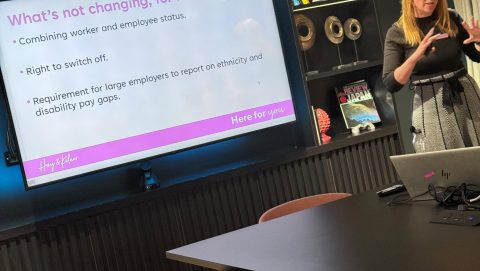
With National Careers Week being held very recently, this is an opportune time for businesses to consider how to build more diverse talent pipelines for the future by engaging with young people with work opportunities.
The report comes at a time when businesses are increasingly recognising the value of engaging in outreach programmes to address their skills shortages, build more diverse talent pipelines and tackle growing inequalities in education and employment. However, many businesses don’t know where to start.
Our aim is to address the growing concern at the lack of meaningful connections between schools and businesses, and how this inequality affects students and young people from diverse and disadvantaged backgrounds the most.
The report seeks to change this by showing businesses how to engage young people in ways that will benefit their organisation, and at the same time boost employment opportunities for young people. Here are 10 recommendations:
Put diversity and inclusion at the heart of programme delivery
Organisations that embed diversity and inclusion successfully in their programmes are insight led, have examined their own diversity and inclusion data, acknowledged and addressed existing diversity gaps and ensured D&I is at the heart of their mission.
Invest in soft skills
Businesses could collaborate with schools, charities or social enterprises to run programmes with students so they can develop soft skills before they start work, or run initiatives such as reverse mentoring programmes between students and colleagues which can help people develop soft skills.
Assume you will always pay young people
Unpaid work opportunities can exclude young people from disadvantaged backgrounds. Companies could offer paid part-time work for young people to broaden the opportunities open to them.
Widen the talent pool
A report from the Social Mobility Commission highlights that some industries focus on a small number of elite institutions for recruitment and fail to recruit talented young people from less advantaged backgrounds. Such barriers need to be recognised to generate change.
Understand the student voice
To recruit more diverse young talent, businesses should consult with young people and ask them what they think. It is also important for businesses to give young people a voice in their companies and provide opportunities to increase their contribution and participation.
Increase workplace encounters with students
Students often don’t have enough meaningful encounters with employers. Equally, employers are often unaware of how to connect with students during the school day (usually during curriculum or pillar days). Companies could create pupil friendly sessions for curriculum days, offering workplace encounters to all year groups and developing contacts with career leads in local schools.
Offer meaningful experiences of the workplace
Work experience placements sometimes don’t always provide a realistic picture of day-to-day working life. Consequently, pupils may not have all the information to make an informed decision about which sectors they would like to work in. Work placements, internships, a day in the office or a workshop delivered in school must be tailored to the school and pupils taking part.
Partner with state schools
It can be challenging to build relationships with busy state schools. Recommendations include leveraging existing school links within the company. Even if companies currently only have private school or grammar school links, contacts at these institutes will have some connections to state schools.
Design sustainable and impactful school outreach programmes
Be open about the desired outcomes from the start, co-creating the programme with diversity networks and other departments in the business, and adding school outreach into someone’s job or a committee.
Have a holistic organisational approach when running school outreach
Connect initiatives to the company’s wider business strategy for greater impact. Gaining senior buy-in for school outreach work is important, as are stakeholder meetings with different departments and external partners to ensure sufficient support.
Christine Kinnear is CEO of With Insight Education
Source – https://www.peoplemanagement.co.uk/





















